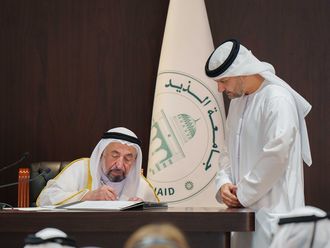Dubai: With the rapid development the UAE is undergoing, especially in the advancement of technology, it is no surprise that sectors from hospitality to health care are constantly redefining their ways of functioning to keep up with the changing times. Education, say experts in the field, should be no different.
Given the UAE’s drive towards adopting smart learning as part of its national education agenda, the question is not so much which teaching methodology will fetch better results but rather how soon can schools in the country transform their infrastructure to use the latest technology, and how fast can teachers be trained to leave outdated learning modes behind and adopt interactive modern ways of teaching.
To learn more about the changing facets of education today, Gulf News spoke to educators and school principals to find out what teaching methods are going past their shelf life and which are increasingly becoming the way forward in schools.
Vandana Marwaha, principal of Delhi Private School in Sharjah, says education has moved away from the traditional approaches which depended solely on the transfer of knowledge from teacher to student as a lateral process.
“Today, it is much more than that,” says Marwaha. “Teaching is collaborative, research-based. It takes place through peer interaction and it is what a student will take away beyond the subjects they learn. {Teaching] is about application and about using education as a tool and not as a product.”
A new approach in education, she believes, is required to cater to the evolving demands of society.
“Because of the rise of technology, we prepare our students with the necessary skills,” says Marwaha. “Not only that, the school also constantly reviews and revitalises its policies and syllabus to enable it. For instance, we use smart interactive boards to enable better learning and greater comprehension. Activity-based learning is a part of our syllabus planner. Project works and research-based learning ensure that students are able to research, sift through information, comprehend and analyse.”
Marwaha also believes that traditional methods of teaching are less beneficial in today’s context compared to modern ones. On the other hand, demands of society can also determine how and when to change education and teaching methods.
One of the markers Marwaha and her school use to determine the success of their teaching methods is by looking at their students’ admissions in top universities around the world.
Affirming the changing definitions of effective teaching methods is Abraham Prakash, the principal of Grade Five to 10 of boys at Indian High School, Dubai. Prakash, with decades of experiences in teaching methodology, says “establishing a connection between real-life situations and teaching methodologies is a must for schools today”.
He believes the scope of knowledge needs to also encompass the pressing socio-economic and political realities of today. “Preparing present-day learners to face the challenges posed by environmental and political changes and the demand and supply inequality in tomorrow’s job market — which is created as a result of explosion of technological solutions — is important,” he says. “The realisation that isolated knowledge of ideas and principles has no relevance in 21st-century learning leads to deliberate and conscious attempts in developing ‘cross curricular links’ which establish connections with real-life situations for every concept learnt.”
Education, says Prakash, has made the leap from being a teacher-centred approach to a learner-centred approach. Today, education is about construction of knowledge and development of skills. Learner-centred approach, he says, can be achieved by providing a rich, varied and interactive environment matching the needs, interests and ability of the learner. “Many of the present-day jobs may still exist in the future, but every one of them will transform and change as technology and communication systems make their impact on them. Therefore, we cannot train the present-day learner for any specific job, In order to be successful in tomorrow’s work places, they have to acquire the 21st-century skills, especially collaborative problem-solving and decision-making.”
When it comes to arguments for retaining traditional modes of teaching, Prakash says there is no justification as the “value of memory recall cannot be replaced by skill”.
It is up to schools, he says, to determine when they should change their teaching methods by international benchmarking and by rankings and targets set by the Knowledge and Human Development Authority (KHDA) for 2021 which are indicators of attainments and capacity to progress.
One way schools can gauge the relevance and improvement of their teaching methods is to keep track of the grade average and student performance. These are strong indicators of whether they are on the right path and need to change their strategy.












